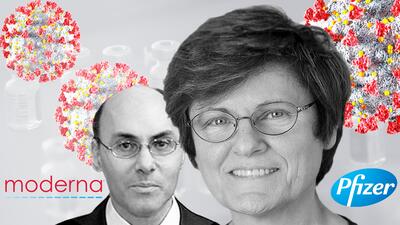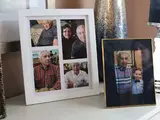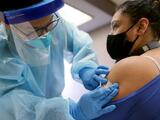How an immigrant scientist paved the way for covid-19 vaccine

When biochemist Katalin Karikó came to the United States in 1985 as a young immigrant from communist Hungary, she had to sell her car on the black market to afford the trip.
A pioneer in the field of genetic messaging, she would go on to play a key role in one of modern science's greatest achievements: the world's first genetically engineered vaccines. The technology is believed to have implications for preventing the spread of other diseases from cancer and strokes to malaria and multiple sclerosis.
Just the latest in a long line of American immigrant scientists, Karikó is now being talked about as a possible Nobel prize winner, along with her American colleague Dr Drew Weissman with whom she developed the patented scientific invention at the University of Pennsylvania.
“This is just kind of unbelievable,” Karikó told the French news agency, AFP, in a video call this week from her home in Philadelphia, adding she was unused to the attention after toiling for years in obscurity.
Karikó is one of several foreign-born scientists and entrepreneurs involved in the covid vaccine breakthrough, including Moderna’s Canadian co-founder, Patrick Rossi, and French CEO, Stéphane Bancel.
“Kate Kariko is a superstar,” Dr. David Langer, the chairman of neurosurgery at Lenox Hill Hospital in New York, wrote on Twitter last week. Langer worked with her as a medical student in the 1990s and became a huge fan of her hard work and creative thinking. They remain friends and he visited her last week to congratulate her for her contribution to the development of the covid vaccine.
“She was an immigrant woman who went through such hardship and overcame so much. I saw it and witnessed her supreme work ethic and focus and always doing what was right against all odds,” he told Univision. “This is a story of grit and determination. She was studying something no-one believed in. She knew she was right, but she didn’t have any grant money,” he added.
“It was difficult because people didn’t believe messenger RNA could be a therapy,” Karikó told another interviewer last week.
Butcher's daughter
Karikó grew up in the tiny town outside Budapest, in a one-room house with no running water and no refrigerator. She got her first taste of biology examining the carcasses of pigs with her father, a Hungarian butcher.
While working at the University of Pennsylvania, Karikó and Weissman discovered a way to configure a key human molecule - messenger RNA — that stimulates the production of proteins that can fight disease. Her work later inspired the founding of Moderna, the US biotech company developing a coronavirus shot that was approved for emergency use in the U.S. on Friday.
Karikó struggled to keep her position at the university after no-one would fund her ‘mRNA research’. She stayed on but was obliged to accept a lower-paid research position, in part so her daughter could get the staff discount at the prestigious university.
Her daughter, Susan Francia, would go on to earn a Master’s degree at UPenn, and won two gold medals with the US Olympic rowing team in 2008 and 2012.
Karikó was let go by the university, a decision it may now regret.
And her synthetic ‘mRNA’ discovery would turn out to be a key element in speeding up the development of a covid-19 vaccine, allowing scientists at Moderna, as well as Pfizer, to dramatically accelerate the time usually needed to develop a vaccine, which previously took several years.
Now aged 65, her previously unheralded career has suddenly transformed in a matter of weeks. Now an RNA specialist at BioNTech, a German biotech firm that developed a coronavirus vaccine in partnership with US pharma giant Pfizer. That vaccine won the race for U.S. approval earlier this month.
Both the Pfizer and Moderna vaccines use mRNA to deliver a coded message to the body that triggers a protein-based immune response that has proven to be highly effective at preventing covid-19.
Weissman, a 61-year-old physician and immunologist previously worked for seven years in the 1990s with Dr Anthony Fauci at the National Institute of Allergy and Infectious Diseases. Fauci this year became a household name during the pandemic as a leading member of the White House coronavirus task force.
In an interview, Weissman praised Karikó as “a brilliant scientist” who wasn’t treated well by the University of Pennsylvania. Despite Karikó losing her university job, Weissman said “we never stopped working together.”
Weissman is also the grandson of immigrants, on his mother’s side from Sicily and his father’s family from Poland.
What is messenger RNA?
Messenger RNA (ribonucleic acid), was first discovered in 1961 at the California Institute of Technology (Caltech), and has been called the “software of life.” Unlike other vaccines, which involve injecting dead pieces of the virus into the body, a vaccine using mRNA sends a set of genetic instructions into cells that generates proteins to help the immune system fight off the coronavirus.
The mRNA acts as an intermediary between human DNA, the genetic database that dictates bodily functions, and the production of proteins which make up the body’s essential living organisms, such as muscle, skin tissue and blood.
“DNA is like a library. It contains books with all the information that you need to conduct your life. They do everything,” said marine biologist Joshua Rosenthal who works on RNA editing at Marine Biological Laboratory in Woods Hole, Massachusetts.
But in order for that information to be useful it has to be “transcribed”, which is where the RNA comes in as a “messenger” to create proteins the body needs to function, he explained.
While most scientists were focused on genetic engineering of DNA, Karikó was a pioneer in the field of exploring how RNA might serve as an alternative method of fighting disease or erasing genetic mutations that cause illness.
Scientists had been injecting lab animals with RNA since 1990. Yet, many gave up on the concept after finding that the animals’ immune systems recognized the injected molecules as foreign — resulting in harmful inflammation and even death.
Karikó’s original invention – the creation of synthetic RNA - wasn’t effective in animals because their immune systems recognized the injected molecules as foreign invaders, triggering an aggressive immune response, causing potentially fatal inflammation.
She refused to give up even as her research funding dried up.
Breakthrough
Eventually, after teaming up with Weissman, the pair came up with a breakthrough in 2005. They figured out how to change one component in the RNA that tricked the body’s immune rejection system. “There are actually 17 different sensors, or proteins in our body, that can recognize RNA. We changed the RNA so they don’t see it anymore, they don’t react to it,” said Weissman.
“That’s the technology that these companies bought,” he added, referring to the Moderna and Pfizer vaccines.
Karikó and Weissman now both work with BioNTech which has seen its market value soar to $25 billion dollars after Pfizer was approval for its vaccine. But they don’t expect to become millionaires any day soon. The patent belongs to the University of Pennsylvania.
“Academics who invent things never becomes billionaires, that’s just not how it works,” said Weissman.
Weissman said he’s happier in the lab, away from the spotlight. It’s also personal. His sister’s best friend in Boston was an early victim of covid in March, aged 59.
after got the call about the Pfizer-BioNTech results, Karikó said she celebrated with a bag of Goobers, her favorite chocolate-covered peanuts.
Experts say the work of Karikó and Weissman could open the door to a whole new field of medicine.
"A million applications"
“We’re just beginning to understand the massive potential of RNA to impact our lives,” said Rosenthal. “There are a million applications that you can imagine if you can control these systems.”
Weissman is already working on four other RNA vaccines for other diseases which he expect to go into clinical trials next year.
“They all got delayed because of covid,” he said. Solutions could include herpes, HIV-Aids, as well as a universal influenza vaccine. “If they work, these are all groundbreaking. They are change the world type vaccines,” he added.
He is also working on RNA as a treatment for some types of pain.
“RNA can do a lot of things. We didn’t reinvent aspirin, we invented a platform that could be used for many different diseases and many different therapies,” he said.



